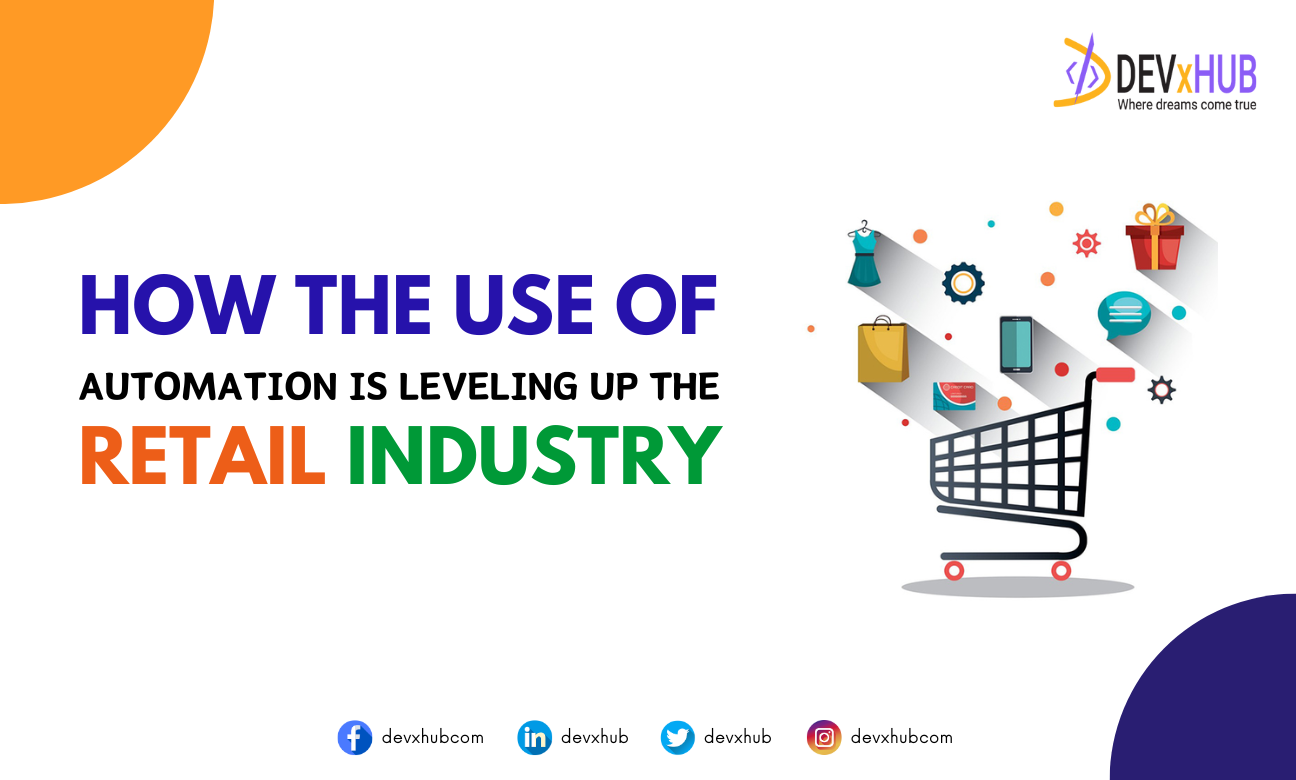Blog - How the use of automation is leveling up the retail industry
In virtually every sector, the rise of automation is akin to a seismic shift, reshaping traditional practices and revolutionizing industries. The retail sector stands prominently in this wave of change. From streamlining daily workflows to optimizing routine reporting, automation is becoming the backbone of modern retail operations. Salesforce reports that nearly three-quarters of automation users acknowledge its role in accelerating task completion, marking a substantial leap in productivity.
The advent of Artificial Intelligence (AI) and machine learning further propels this transformation, expanding automation’s scope from mundane tasks to complex operations. Particularly noteworthy is the integration of AI-driven solutions in process automation, a cornerstone of supply chain management within the retail and consumer sectors.
Given these advancements, it’s hardly surprising that businesses at the forefront of automation are reaping a myriad of benefits. They enjoy heightened productivity, enhanced agility, reduced costs, a more motivated workforce, and ultimately, a healthier bottom line.
This blog aims to delve deeper into the potential of automation within the retail industry, spotlighting its mechanics, diverse applications, and pivotal role in augmenting human labor rather than supplanting it.
Decoding Retail Automation
At its core, retail automation involves the strategic deployment of automated tools to refine and optimize everyday processes across various retail operations, whether in-store, online, or a hybrid model. Through a fusion of innovative technologies, automation endeavors to drive efficiencies, curtail expenses, boost productivity, minimize errors, and elevate overall customer experiences.
Applications Galore
The integration of automation within the retail landscape manifests in myriad applications. From online platforms to brick-and-mortar stores, retailers are harnessing automation to streamline operations and enhance customer satisfaction. Notably, process automation in supply chain management has emerged as a linchpin for efficiency gains, as evidenced by successful implementations in billion-dollar Consumer Packaged Goods (CPG) companies.
Major trends in automation applications encompass:
In-Store Processes Automation:
Equipping store personnel with portable devices such as tablets empowers them with automation capabilities at their fingertips. Virtual assistants furnish real-time information, aiding staff in assisting customers promptly. Concurrently, automation targets erstwhile manual tasks like returns processing and inventory management. For instance, Paysafe’s deployment of 28 automations yielded significant time savings, eclipsing 30,000 staff hours.
eCommerce Customer Service:
The advent of chatbots and virtual agents revolutionizes customer service paradigms in the digital realm. These AI-driven entities not only reduce labor costs but also bolster customer engagement and satisfaction. Paysafe’s migration to mobile chatbots resulted in an impressive 95% bot case completion rate, simplifying processes like generating digital return labels.
Customer Behavior Analysis:
Leveraging automation and AI, retailers gain insights into customer behavior, facilitating trend forecasting and personalized marketing strategies. This dual-pronged approach ensures retailers stay ahead of market dynamics while catering to individual customer preferences.
Unlocking the Benefits
The allure of automation lies in its multifaceted benefits, which extend across various facets of retail operations:
- Enhanced Customer Experience: Automation enables seamless interactions and personalized experiences, aligning with evolving consumer expectations.
- Improved Employee Experience: By automating mundane tasks, employees are freed up to focus on value-adding activities, fostering job satisfaction and retention.
- Augmented Brand Reputation: Consistent, high-quality service cultivates a positive brand image, setting retailers apart from competitors.
- Heightened Customer Loyalty: Satisfied customers are more likely to return, contributing to long-term profitability.
- Operational Efficiency: Automation streamlines processes, resulting in faster, more reliable task execution and resource optimization.
- Stimulated Business Growth: By enhancing processes and customer experiences, automation fuels revenue growth and market expansion.
- Futureproofing: Early adoption of automation ensures retailers remain agile and adaptable in the face of future industry disruptions.
Automation and the Human Workforce: A Synergistic Relationship
Contrary to popular apprehensions, automation isn’t synonymous with job displacement; rather, it complements human capabilities. By automating repetitive tasks, employees are liberated to focus on higher-value endeavors, thereby enhancing overall productivity and job satisfaction. Change management plays a pivotal role in ensuring a smooth transition, with an emphasis on upskilling and evolving job roles to align with automation-driven workflows.
The Future of Automation in Retail
The future trajectory of automation in retail is inexorably linked to the continued evolution of AI and machine learning. These technologies promise hyper-personalized customer experiences and optimized supply chain operations, heralding a new era of retail efficiency. Moreover, the democratization of automation tools and resources will democratize the playing field, empowering even smaller retailers to compete on equal footing with industry giants.
In conclusion,
the role of automation in retail, particularly within supply chain management, is poised for further expansion. Its potential to drive operational efficiency and foster business growth underscores its indispensable role in the retail landscape. For retailers seeking to harness the power of automation, partnering with experts like Ciklum can unlock unparalleled insights and innovations, propelling them towards sustainable growth and success in an increasingly automated world.
Related Posts
Categories
- App Development (2)
- Design (2)
- DEVxHUB (30)
- Digital Marketing (2)
- Guide (24)
- It Bangladesh (1)
- Logo design (1)
- Operating system (1)
- Personal Improvement (14)
- Planning (4)
- Project management (3)
- Social media (2)
- Software Development (5)
- Software Quality Assurance (8)
- Startups (1)
- Team work (1)
- UI UX (1)
- Web Development (6)
Main Tags
- 2024
- Android
- app development
- bangladesh
- content writing
- design
- devxhub
- Digital marketing
- Guide
- IOS
- It
- logo design
- Operating system
- Personal Improvement
- planning
- project management
- social media
- Software Development
- Software Quality Assurance
- software testing
- software testing types
- Startups
- Success
- team
- UI UX
- UI UX design
- VR
- Web Development















